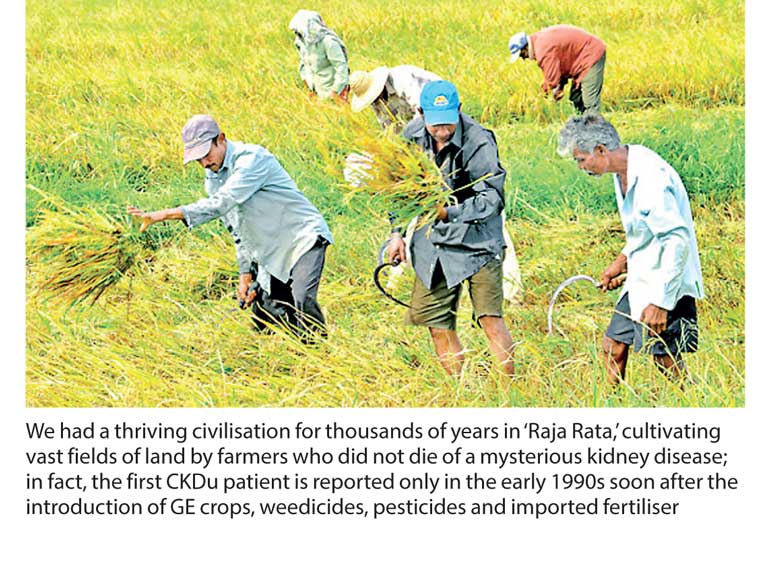Thursday Feb 19, 2026
Thursday Feb 19, 2026
Wednesday, 23 August 2017 00:00 - - {{hitsCtrl.values.hits}}
 This is my response to the unscientific blabbering of an article by an archaic old man called Chandre Dharmawardana, published in Daily FT on 10 August. (See here: http://www.ft.lk/article/634306/False-claims-about-the-herbicide-glyphosate)
This is my response to the unscientific blabbering of an article by an archaic old man called Chandre Dharmawardana, published in Daily FT on 10 August. (See here: http://www.ft.lk/article/634306/False-claims-about-the-herbicide-glyphosate)
According to his Wikipedia page, Chandre lives in Canada and is a Canadian citizen. As for the tone of my writing here, please do not expect any respect for a man who humiliates a fellow scientist who he dismisses as “a lady with psychic powers”, a blatant misrepresentation of the facts.
Chandre seems to be suddenly interested in the glyphosate ban in Sri Lanka. He conveniently forgets to mention that glyphosate is legally banned not only in Sri Lanka but also in Malta, El Salvador, Netherlands, France and Peru. If he reads news, he should know that an EU-wide glyphosate ban was marginally halted due to Germany’s political interests, and is very likely to happen soon nevertheless.
Perhaps Chandre’s memory is also too feeble to remember that over 30 countries including Russia do not import or use glyphosate anyway because they do not grow or import Genetically Engineered (GE, a.k.a. Genetically Modified or GM) crops.
For a person who claims to be a scientist, it is ridiculous how he mentions the WHO (World Health Organisation) so loosely but fails to mention that glyphosate is in fact categorised as “Probably Carcinogenic” to humans (Group 2A) by that very WHO! Here is a scientist who says that he sees no “health risk” when the WHO’s Cancer Research arm itself says that glyphosate is a probable carcinogen.
Chandre then uses an old school tactic called “false equivalence” by saying that peanuts kill more people than glyphosate in the USA. Firstly, the two are factually incomparable because there is no scientific study on the deaths caused by glyphosate in the USA. Your darling Monsanto will assure such study is never done! Secondly, it’s like saying negligent driving kills more people than tobacco smoking or vice versa. One doesn’t qualify or disqualify the other. Is this the best argument you have for glyphosate?
Another one of Chandre’s meandering arguments is that countries like New Zealand use 35 times more glyphosate than Sri Lanka, but New Zealanders don’t have chronic diseases as much as Lankans. (I will not even write about the New Zealand’s unprecedented soil and water pollution due to excessive use of harmful chemicals in their farming.)
He then connects “high standard of living” and blames that our farmers are dying because of “low standards of living”. It’s not clear if he’s referring to all chronic diseases or just CKD. It’s also not clear which “standards” of living he’s referring to. His article is so incoherent and inconsistent, one must read it ever so patiently to make any sense of it.
He’s probably talking about lack of access to clean and safe drinking water in Sri Lanka. But he himself contradicts here. From one side, he’s saying that glyphosate is not a killer because if it is, then New Zealanders should die more. In the same paragraph, he says that New Zealanders are not dying as much because they have safer drinking water. So then one can argue that no matter how much glyphosate a country uses in agriculture, as long as it purifies and cleans the drinking water, the citizens would not be affected. Therefore, it doesn’t prove that glyphosate doesn’t kill people because you remove it from the water before drinking anyway. This is child’s play.
In his article Chandre then attributes the Chronic Kidney Disease which kills over five Lankans every day and disables many more farmers, to the “hardness” in water. It’s appalling how a so-called chemist explains water hardness.
farmers, to the “hardness” in water. It’s appalling how a so-called chemist explains water hardness.
First, he concludes by his God-given right, that fluoride, then magnesium in water (magnesium is a metal) causes CKD. What he is purging to say is that calcium and magnesium “carbonates” that cause hardness in water is the reason for CKD.
People who give up their Sri Lankan citizenship in hopes of “high standards of living” hate to remember that we had a thriving civilisation for thousands of years in ‘Raja Rata,’ cultivating vast fields of land by farmers who did not die of a mysterious kidney disease. In fact, the first CKDu patient is reported only in the early 1990s soon after the introduction of GE crops, weedicides, pesticides and imported fertiliser.
The funniest part about Chandre’s article which has a number of grammar mistakes too is that it is too easy to disprove his arguments using his own points. He explains that glyphosate was first tested as a chelating agent which binds to heavy metals such as cadmium, mercury and lead. That’s true. In fact, it strongly and readily binds to calcium and magnesium as well. What is also true is that such glyphosate-metal complexes also dissolve in water and increase the hardness and toxicity of groundwater, which makes it much easier to enter into the human body. If hardness is a devil, then glyphosate is the mother of all devils.
For a scientist who claims to really care about the Lankans dying of CKD, Chandre should be spending his last days trying to find a solution to the problem instead of whitewashing Monsanto. Have you no shame as an academic to write silly articles in support of Monsanto? How low can you get to actually recommend that farmers use a chemical… any chemical… without goggles or gloves?
A chemical which has been categorised as a possible carcinogen by the WHO? How dare you endanger the Lankan lives with your unsubstantiated claims? The Lankan Government and the public should actually take legal action against this man for putting human lives in danger.
Chandre is violating the human rights of Sri Lankan farmers by recommending unsafe practices which can cause harm to their lives. His current employers according to his Wikipedia page, namely University of Montreal and the National Research Council of Canada, must immediately investigate this matter and ask Chandre to withdraw these unscrupulous and unsubstantiated statements in full.
Let me conclude this by saying that the public should understand that the problem is not merely about glyphosate. Glyphosate (sold under the brand of Roundup by Monsanto) is a chemical that kills plants. The only plants it doesn’t kill are the Genetically Engineered (GE) plants which are sold to us by Monsanto... It’s easy to make the connection. It’s how Monsanto maintains its monopoly in farming. That’s why Monsanto spend billions of dollars lobbying and buying politicians and academics. But intelligent farmers and intelligent consumers around the world are increasingly saying no to Genetically Modified crops.
I have a degree in genetics, microbiology and biochemistry. Unlike some paid puppets, I urge the intelligent readers to search for the pros and cons of genetic re-engineering and the effects of Monsanto monopoly not only in health and nutrition, but also in economy and politics.
We are talking about the future of our country, its resources and its people. It may be a casual affair for Chandre, but Lankan lives cannot be so easily discounted. This is a much bigger problem than glyphosate. I challenge Chandre Dharmawardana to come to any public debate on this matter.
(This is a response to an article written by Prof. Chandre Dharmawardana titled 'False claims about the herbicide glyphosate', published by DailyFT on 10 August, 2017. Click here to read the article.)